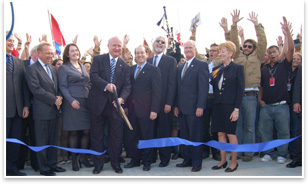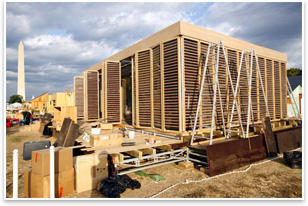
| Germany’s
Technische Universität Darmstadt Aces Solar Decathlon Architecture
Contest
Gregory Kiss, AIA, who with Susan Maxman, FAIA, and Grant Simpson, FAIA, juried the architecture competition, said that the jury felt unanimously that the Darmstadt team’s project was “in a class by itself.” He had high praise for all the projects, however, saying that the students went far beyond the requirements for beauty, innovation, and efficiency in their versatile competition entries. Citing the 2030 Challenge, developed by Ed Mazria, FAIA, and adapted by the AIA as the norm for architecture design in the coming decades, Kiss said that “the students present an incredible challenge to all of us” in going beyond this standard. In particular, Kiss said, the jury was impressed by the individual entries’ ability to:
Kiss also complimented the projects on their excellence of communication and documentation. Richard King, director of the Solar Decathlon for the U. S. Department of Energy, told the group that Sunday, October 14, saw “record-breaking crowds visit all of the houses,” which he characterized as “celebrating all the beauty and splendor of good architecture.”
This is the first year a German school is competing in the Solar Decathlon. Upon receiving their award for the Architecture Contest, the students from Darmstadt, obviously and rightfully proud of their prize, took a moment to thank all the other teams in the Solar Village this week for coming by to visit and make them feel welcome. |
||
Copyright 2007 The American Institute of Architects. All rights reserved. Home Page |
||
news headlines
practice
business
design
Captions
1. The Darmstadt project was very popular with visitors to the Mall. Photo
by Douglas E. Gordon, Hon. AIA.
2. Secretary of Energy Samuel Bodman cuts the ribbon to open the Solar
Decathlon on October 12, surrounded by students and sponsors, including
AIA President RK Stewart, FAIA, second from Bodman’s left. Photo
by Douglas E. Gordon, Hon. AIA.
3. The Darmstadt project under construction. Photo © Jim Tetro, Solar
Decathlon.
The winner of the overall Solar Decathlon will be announced October 19 at 2 pm. ET. You can visit the Web site for continued updates.
AIArchitect will continue coverage next week.
For the list of 20 competing teams and links to their Web sites, visit the Solar Decathlon team page.
To listen to a podcast featuring Martha Bohm, a faculty adviser to the Cornell University team, and her explanation of the valuable two-year struggle it is to compete, visit the AIA PodNet page.
The 10 contests
are:
• Architecture—200 points
• Engineering—150 points
• Market Viability—150 points
• Communications—100 points
• Comfort Zone—100 points
• Appliances—100 points
• Hot Water—100 points
• Lighting—100 points
• Energy Balance—100 points
• Getting Around—100 points.

 Summary:
Summary: The University of Maryland was awarded second place in the Architecture
contest; the Universidad Politecnica de Madrid won third place.
The University of Maryland was awarded second place in the Architecture
contest; the Universidad Politecnica de Madrid won third place. “Made in Germany”
“Made in Germany”